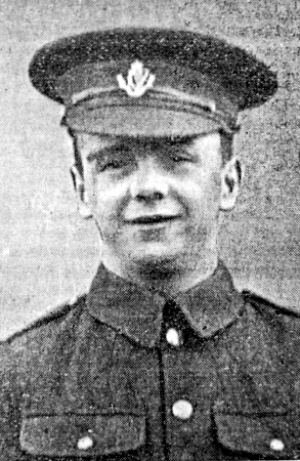
Clifford Hemingway Ibbotson was born in Ossett in 1893, the second son of Ossett rag grinder Joseph Ibbotson and his wife Emma (nee Hemingway), who married in 1882. The couple had two children, Gilbert born in 1884 and Clifford. In 1901 the family lived on Headlands Road, Ossett and by 1911 they had moved to Old Bank, Earlsheaton, Dewsbury where 17 year-old Clifford was working as a rope lad in the local pit.
Clifford Ibbotson served in the Connaught Rangers and is remembered in the Ireland Casualties of World War One, 1914-1918 in the following terms: Ibbotson, Clifford, Reg. No. 5999, Rank, Private, Connaught Rangers, 1st battalion: Died, Mesopotamia, July 10th, 1916; born Ossett, Yorkshire.
A large contingent of Yorkshire men were assigned to either Connaught Rangers or Munster Fusiliers in 1916 after enlisting. This was a time when Ireland was seeking independence and some areas of Ireland had difficulty recruiting into local regiments. The transfers were done to bolster battalion strength.
Clifford Ibbotson’s army service record has not survived, but it is known that he enlisted at Dewsbury and he was awarded the British and Victory medals. He did not serve overseas before the 31st December 1915 and therefore did not qualify for the 1914/15 Star.
In August 1914, the 1st Battalion of the Connaught Rangers were based in Ferozepore, India as part of the 7th (Ferozepore) Brigade in the 3rd (Lahore) Division. They sailed from Karachi on the 28th August 1914 as part of the Indian Corps and moved to France, landing at Marseilles on 26 September 1914. On the 5th December 1914, they absorbed the 2nd Battalion after they had suffered heavy losses in the Rearguard Affair of Le Grand Fayt. The Battalionn served on the Western Front until leaving France on the 11th December 1915, whereupon it moved to Mesopotamia, landing at Basra on the 10th January 1916. On the 3rd April 1918 they sailed from Kuwait to Egypt for service in Palestine.
On January 10, 1916 the 1st Connaught Rangers, having left the Western Front, disembarked at Basra and were transported up the Tigris River to Kut. Various attempts to reach the trapped British force at Kut met with failure throughout the early months of 1916. Losses among the relieving forces were high as they tired to vain to break through the Turkish lines. Finally on April 28, 1916 short of food and water the garrison at Kut surrendered. Throughout the summer of 1916 the ranks of the Connaught Rangers facing the Turkish lines at Kut were decimated by a cholera epidemic, which claimed many lives.
The “Ossett Observer” 1 had this obituary for Clifford Ibbotson:
“Chickenley Heath Man’s Death In India – From The Effects Of Heat – Private Clifford Ibbotson, whose father, Mr. Joseph Ibbotson, lives at Chickenley Heath, where he works at a mungo mill, is reported to have died in India from the effects of heat. The official intimation says that his death occurred ‘at a place not stated’ on the 10th July. The soldier was 23 years of age and unmarried. He joined the army about a year ago, being before that in the employ of the Lancashire and Yorkshire Railway Company at Thornhill Lees, where his father, though an Ossett man, had lived for a few years. He was in the Connaught Rangers, and his battalion went out to India several months ago. Private Ibbotson had not in his letters sent home made any reference to suffering from the heat. A letter was received from him only a few days before the notification of his death, and in it he referred to an expectation that his battalion would be sent to France.”
The “Ossett Observer” obituary was incorrect and in fact, we know that Clifford Ibbotson died in Iraq rather than India. It is also possible that he died from cholera given that the Connaught Rangers suffered a cholera epidemic in 1916.
Private Clifford Ibbotson, aged 23 years, died on the 10th July 1916. He is buried at grave reference VI. P. 10. at the Basra War Cemetery, 2 Iraq. Basra is a town on the west bank of the Shatt-al-Arab, 90 kilometres from its mouth in the Persian Gulf. The cemetery is about 8 kilometres north-west of Basra.
During the First World War, Basra was occupied by the 6th (Poona) Division in November 1914, from which date the town became the base of the Mesopotamian Expeditionary Force. A number of cemeteries were used by the MEF in and around Basra; Makina Masul Old Cemetery was used from December 1914 to October 1916 and the Makina Masul New Extension was begun alongside the old cemetery in August 1917. These two sites, enlarged later when more than 1,000 graves were brought in from other burial grounds, now form Basra War Cemetery.
The cemetery now contains 2,551 burials of the First World War, 74 of them unidentified. The headstones marking these graves were removed in 1935 when it was discovered that salts in the soil were causing them to deteriorate. The names of those buried in the graves affected are now recorded on a screen wall.
References:
1. “Ossett Observer”, 26th August 1916